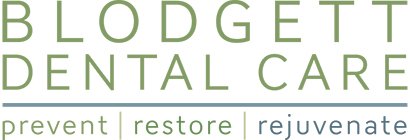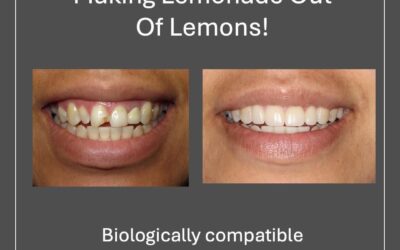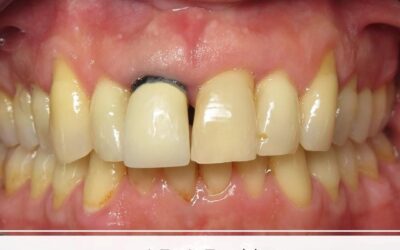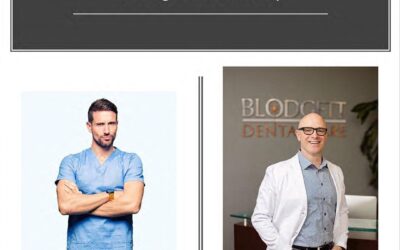Symptoms vs. Systems: My Holistic Approach to Dentistry & Health

Recently, I was having lunch (at Nicholas, one of my favorite Portland restaurants with great gluten-free options) with a friend and he asked me, “What about your dental practice today would amaze the dentists you learned from in dental school and during your residency?”
The question really made me think. Is it the incredible technological advances, like three-dimensional digital x-rays and laser periodontal treatments that define the changes I’ve seen in dentistry?
Or is there something else even more valuable to my patients? Something unimaginable to the previous generation of dentists?
I settled upon an answer that I’d like to share with you over the next two weeks. This week, I’ll introduce you to my holistic and systems-based approach to health. You’ll also learn why both dentists and our patients need to stop thinking only about “dental health” and start thinking about “overall health.”
Let’s get started.
A Bit About My Background
OHSU Campus
I was very fortunate to receive a wonderful dental education at Oregon Health Sciences University’s (OHSU) School of Dentistry. And I wouldn’t be the dentist I am today without the experience I gained during my General Practice Residency at the Veteran’s Administration Hospital in Portland.
Throughout my professional career, I have been blessed to be mentored by three incredibly talented dentists: Dr. V. Kim Kutsch (inventor of the CariFree decay-stopping system), Dr. Bob Gregg (co-inventor of the LANAP regenerative periodontal protocol and Periolase MVP-7 laser), and Dr. Scott Neish (master of Dental Occlusion and Airway Maximization).
All three of these mentors encouraged me to keep my mind open, never assume I know the answers and pursue my passion for oral health care with all my energy. Maintaining a blend of enthusiasm and humility has kept me excited and passionate about my field of work.
Over the 20+ years that I’ve been studying and practicing dentistry, I’ve learned a lot about both the science and philosophy of dental health (a term I’ll talk more about in a bit).
And I have not stopped learning. I’m always looking for new ways I can help my patients be healthier, whether that means new instrumentation, new technologies, or even new approaches to dental health.
Why Do I Emphasize “Dental Health”?
Sore Throat
If a person has a sore throat, do we conclude that they have a problem limited to their “throat health”? Or when someone suffers from diabetes do they think of themselves needing help with only their “pancreas health”?
No. We know that these are symptoms that reflect the generalized state of our health.
Over the years I’ve found most people think of cavities and gum disease as ailments relating only to the mouth. Frequently, we miss a simple point: the mouth is connected to the rest of our body!
This is understandable when you think about it. Isn’t the solution in most dental offices simply: see a cavity, drill it, and fill it! Rarely are general health concerns such as diet, sleep health, medications and social habits discussed– yet these issues all affect our risk for tooth decay.
Isn’t our health training system interesting? Medical doctors (MDs) are trained in medical school, first studying general medicine, then specializing in fields like ophthalmology (eyes) or otorhinolaryngology (ears, nose, and throat).
See what’s missing? The mouth, teeth, tongue, and gums. Those specific parts of our anatomy are being studied primarily by dental students in a separate program and school of their own.
In 2015, why are dental students taught separately from “traditional” medical students? Clearly, we are all treating a whole person, not just teeth! I think it has something to do with the history of dentistry. The first “dentists” were primarily barbers by trade and they did little more than (painfully) extract damaged and diseased teeth.
Until relatively recently, dentistry has been a reactive practice. Meaning that dentists reacted to their patients’ symptoms– bleeding gums, toothaches, etc. The idea of proactive (preventative) dentistry generally has not been the focus of most dental practices.
That’s why both the medical establishment, and by extension most people, treat dentistry as a separate science with a different approach, and even different results.
I think that’s a mistake, and one that I hope to see changed in my lifetime.
Your Dental Health is Your Health
When working with my patients, I focus on their overall health, not just their dental health. In fact, I don’t think there’s a need to distinguish between dental health and overall health and well-being.
Your dental health is an important aspect of your general health– one you can’t ignore.
That leads me to answer the question with which I started this blog post. What is it about my practice that is radically different from the majority of dental practices from a generation ago?
Symptoms vs. Systems
Previous generations of dentists generally treated their patients’ symptoms. That’s pretty much all they could do.
For example, if a patient had a cavity, a dentist would fill it and send the patient on their way. If the same patient came back six months later with two more cavities, the dentist would fill those, too. The concept of “decay risk management” may have existed, but most frequently, was not practiced.
I’m fortunate enough to have been exposed to new ways of thinking and to have been working during a time when technological advances have made it possible for me to do much more than simply treat symptoms.
Instead of treating symptoms, I treat systems.
What Are Systems? And How do I Treat Them?
Your body is made up of a series of interconnected systems.
Your teeth and gums aren’t separate from your eyes, nose, ears, throat, heart, lymph nodes, heart, lungs, and other systems. The health of your digestive system (heavily influenced what you put in it) directly affects the health of your teeth and gums. Your heart and lungs work together, not separately. You can’t have healthy skin without healthy veins and arteries.
You get the point.
We’re a series of systems that must work together in order for us to achieve optimum health.
This is also known as a holistic approach to medicine and it’s the philosophy I apply to my dental practice. A holistic approach is one that considers the whole person– body, mind, spirit, and emotions– in the quest for health and wellness.
When I work with a patient, I don’t simply treat their symptoms. I look at them as a whole person and use my training and experience as a dentist to help them optimize their overall health and well-being.
The Burning House Analogy
This concept can be difficult for many people to fully understand, simply because for their entire lives they have gone to the doctor or the dentist to fix a problem or clear up a symptom. They’re not used to the idea of a systems-based approach to health.
There’s an analogy I like to use to help people understand what I’m talking about. Imagine that a house on fire. The fire has burned away most of the roof. Who would you call first? A roofer to replace the burned roof or the fire department to put out the fire?
In this analogy, if we were to treat the symptom (replacing the burned roof), we’re ignoring the underlying problem (the fact that the house is still on fire). Only by looking beyond the symptom and treating the whole house as one connected system can we solve the problem causing the symptom (burned roof).
Next Week: My Holistic Approach to Dentistry in Action
Next week, I’ll be publishing the second half of my thoughts on systems, symptoms, and my holistic approach to dentistry.
I’ll show you several practical applications of my work as a holistic dentist. I’ll talk about non-surgical sleep apnea cures (not simply treatments), the dangers of mercury, and my techniques for restoring gum health.
In the meantime, if anything I’ve written today has resonated with you, I’d love to hear from you. Contact me or leave a comment below with your questions and thoughts.
Photo Credits: Com Salud, Michael Andersen
Read Also
Wellness Wednesday: Making Lemonade Out Of Lemons!
Making Lemonade Out Of Lemons Today’s health recovery story is one of my favorites! From the moment I met this woman I thoroughly enjoyed her spirit. She was determined to regain her total health and wellness and to pursue the smile of her dreams! Like many people she...
Toxic Tuesday: Gangrene Tooth Causing Sinus and Lung Problems
Toxic Tuesday: Gangrene Tooth Causing Sinus and Lung Problems Toxic Tuesday: Gangrene tooth causing sinus and lung problems. Today’s story is about a middle-aged man who injured his front tooth as a child. After the traumatic tooth accident, the nerve died and root...
The Differences Between Biological and Holistic Dentistry
The Differences Between Traditional and Biological Dentistry Wellness Wednesday: The differences between traditional and biological dentistry. One of the questions I am frequently asked is: “How would you describe the difference between traditional and...




